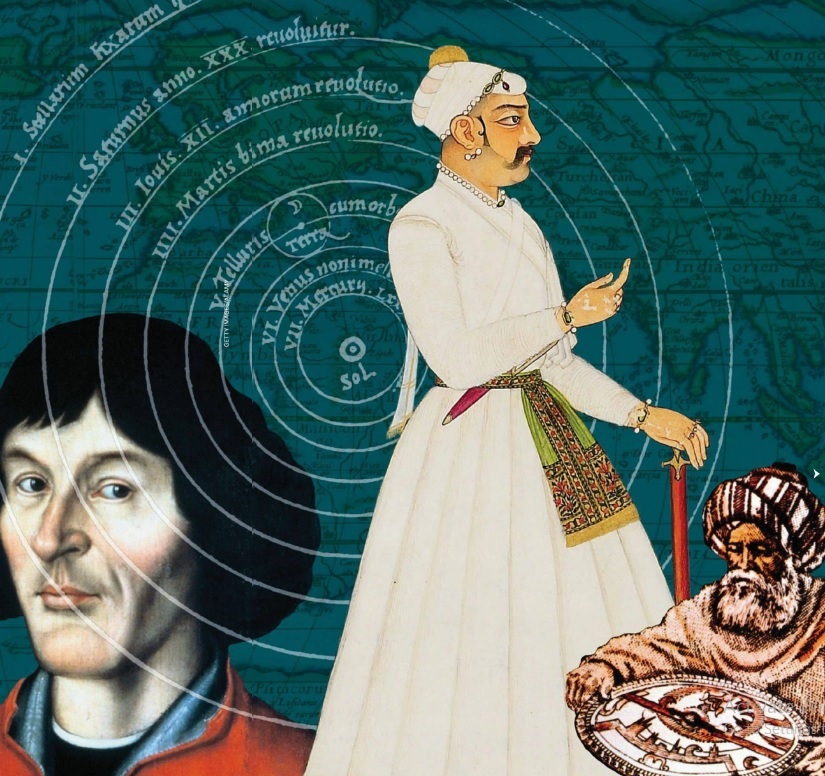
When we think of a lone scientific genius, we usually think of someone like the Polish astronomer Nicolaus Copernicus. Working away in isolation amid the grandeur of Frombork Cathedral, Copernicus developed a radical new scientific theory.
In On the Revolutions of the Heavenly Spheres, published in 1543, Copernicus challenged ancient tradition by putting the Sun, rather than the Earth, at the centre of the universe. This marked the beginning of what is often called the “scientific revolution”, the period between around 1500 and 1700 when European thinkers made incredible progress. This was the age of the Italian mathematician Galileo Galilei, who first observed the moons of Jupiter, and the English mathematician Isaac Newton, who first set out the laws of motion. Copernicus, like Galileo and Newton, forged ahead with a bold new scientific theory.
There is, however, a big problem with this account of the origins of modern science. By focusing on a few European geniuses, we miss a much more diverse and global story. We also give the impression that science is separate from history, that it develops independently of wider world events. In fact, science is just as much a part of world history as art, religion, culture, and politics.
Copernicus may have been a genius, but he was far from isolated. He wrote at a time when Europe was forging new connections with Asia, with caravans travelling along the Silk Road and galleons crossing the Indian Ocean.
This story is from the October 2022 edition of BBC History UK.
Start your 7-day Magzter GOLD free trial to access thousands of curated premium stories, and 8,500+ magazines and newspapers.
Already a subscriber ? Sign In
This story is from the October 2022 edition of BBC History UK.
Start your 7-day Magzter GOLD free trial to access thousands of curated premium stories, and 8,500+ magazines and newspapers.
Already a subscriber? Sign In

The Aztecs at war
RHIANNON DAVIES discovers why war was so important to the Mesoamerican people - and why they believed a badly cooked meal could prevent a soldier from shooting straight

Towering achievement
NATHEN AMIN explores a 13th-century stronghold that was built to subdue independent-minded Welsh people, yet has since become a symbol of courage in the face of overwhelming odds

Eighteenth-century mushroom ketchup
ELEANOR BARNETT shares her instructions for making a flavourful sauce with roots in south-east Asia

Goodbye to the gilded age
JOHN JACOB WOOLF is won over by an exploration of the Edwardian era, which looks beyond the golden-era cliché to find a nation beset by a sense of unease

The power of the few
Subhadra Das's first book catches two particular waves in current publishing.
The 'badass' icon
One of the problems with biography, if an author is not careful, is that it can quickly become hagiography.

Ghosts of Germany's past
KATJA HOYER is impressed by a study of a nation's attempts to grapple with the crimes it perpetrated during the Second World War

A window onto England's soul
SARAH FOOT has high praise for a book that traces the evolution of English Christianity over the course of 1400 years, through the lives of its greatest thinkers

"There was a general perception that Queen Victoria's mourning was neither normal nor acceptable”
JUDITH FLANDERS talks to Rebecca Franks about her new book, which delves into the customs surrounding dying, death and mourning in Victorian Britain

"Indigenous children were forcibly separated from their families"
HIDDEN HISTORIES... KAVITA PURI on the legacy of Canada's residential schools